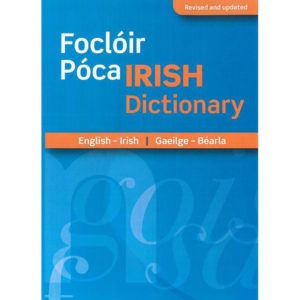Níor bhris focal maith fiacail riamh.
Níor bhris focal maith fiacail riamh.
A good word never broke a tooth.
Note: A kind word is always welcome. Another variation of this week’s proverb says, “Ní mhillean dea-ghlór fiacail.” (A sweet voice does not injure the teeth.) One’s mother might tell you, “It won’t kill you to be nice.” A French speaker may say, “Douces paroles n’écorchent pas la langue.” (Sweet words will not scrape the tongue.) “Good words are worth much, and cost little.” George Herbert, Jacula Prudentum [1651] no. 155. However, Myles na Gopaleen has reserved his store of kind words for all kinds of Irish words, leaving few kind words to say about the few words in the English lexicon:
A lady lecturing on the Irish language drew attention to the fact (I mentioned it myself as long ago as 1925) that while the average English speaker gets along with a mere 400 words, the Irish-speaking peasant uses 4,000. Considering what most English speakers can achieve with their tiny fund of noises, it is a nice speculation to what extremity one would be reduced if one were locked up for a day with an Irish-speaking bore and bereft of all means of committing murder or suicide.
My point, however, is this. The 400/4,000 ratio is fallacious; 400/400,000 would be more like it.
… [For example]
Your paltry English speaker apprehends sea-going craft through the infantile cognition which merely distinguishes the small from the big. If it’s small, it’s a boat, and if it’s large, it’s a ship. In his great book, An tOileánach, however, the uneducated Tomás Ó Criomhthain uses perhaps a dozen words to convey the concept of varying super-marinity — áthrach long, soitheach, bád, namohóg, bád raice, galbhád, púcán and whatever your having yourself.
The plight of the English speaker with his wretched box of 400 vocal beads may be imagined when I say that a really good Irish speaker would blurt out the whole 400 in one cosmic grunt. In Donegal there are native speakers who know so many million words that it is a matter of pride with them never to use the same word twice in a life-time. Their life (not to say their language) becomes very complex at the century mark; but there you are.The Best of Myles, Flann O’Brien, Dalkey Archive Press, 1999, pp. 278-279.
Myles na gCopaleen is the Irish-language pseudonym of Brian Ó Nuallain. Flann O’Brien is the English-language pseudonym of Brian Ó Nuallain. Ó Nuallain was born in Strabane, County Tyrone, in 1911 and he died in Dublin in 1966. He wrote a column called “Cruishkeen Lawn” in the Irish Times, first in Irish, and later in English. The excerpt above is reprinted from one of those columns. Ó Nuallain wrote a classic satire in Irish, An Béal Bocht (The Poor Mouth), in 1941. He wrote several plays and novels in English, most notably, At Swim-Two-Birds in 1939.
